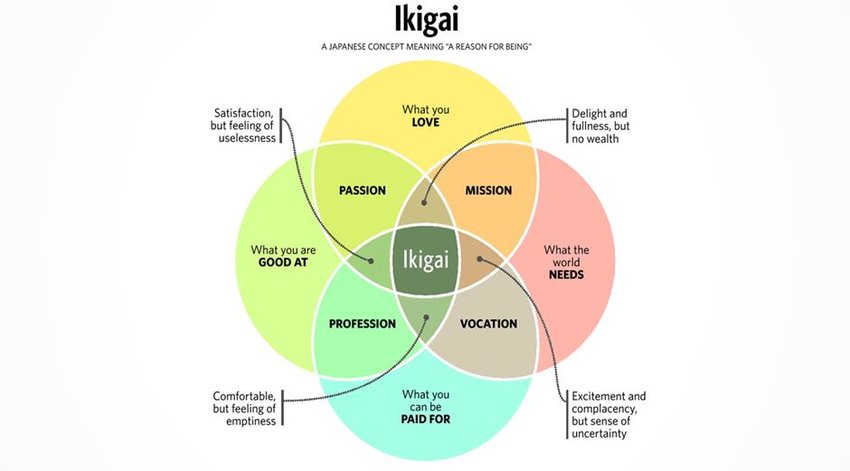
Have you ever wondered why some people seem to wake up every morning with a sense of purpose and excitement, while others struggle to find meaning in their daily lives? The answer might lie in a Japanese concept called ikigai. Pronounced “ee-kee-guy,” this ancient philosophy has been gaining popularity worldwide as a way to live a happier, more fulfilling life. But what is ikigai, and how can it help you find your true purpose? Let’s dive in and explore this fascinating concept.
What is Ikigai? A Simple Explanation
Ikigai is a Japanese word that combines two terms: “iki,” which means “life,” and “gai,” which means “value” or “worth.” Together, ikigai translates to “a reason for being” or “a reason to wake up in the morning.” It’s the thing that gives your life meaning and makes it worth living.
In Japan, ikigai is deeply rooted in the culture. Many Japanese people believe that everyone has an ikigai, but it takes time and self-reflection to discover it. It’s not just about your job or career; it’s about finding joy and purpose in all aspects of life, whether it’s through your work, hobbies, relationships, or contributions to society.
The Four Elements of Ikigai
To better understand what is ikigai, let’s break it down into its four main components. These elements overlap to create a sense of balance and fulfillment in life. Think of them as four circles in a Venn diagram, with ikigai at the center where all four intersect.
1. What You Love (Your Passion)
This is about doing things that bring you joy and make you feel alive. It could be a hobby, a creative pursuit, or simply spending time with loved ones. Ask yourself: What activities make you lose track of time? What do you enjoy doing so much that you’d do it even if you weren’t getting paid?
2. What You’re Good At (Your Vocation)
This refers to your skills and talents. What are you naturally good at? What have you worked hard to master? Your vocation doesn’t have to be your job; it could be something you do in your free time, like cooking, writing, or teaching others.
3. What the World Needs (Your Mission)
This is about contributing to something bigger than yourself. It could be helping others, solving a problem, or making a positive impact on your community or the planet. Ask yourself: How can I use my skills and passions to make the world a better place?
4. What You Can Be Paid For (Your Profession)
This is the practical side of ikigai. While it’s important to do what you love, you also need to make a living. This element is about finding a way to turn your passions and skills into a sustainable career or income source.
When these four elements come together, you’ve found your ikiga; the sweet spot where your passions, talents, mission, and profession align.
Why is Ikigai Important?
Now that we’ve answered the question, “What is ikigai?” let’s talk about why it matters. In today’s fast-paced world, many people feel stressed, overwhelmed, and disconnected from their true selves. They chase money, success, or societal expectations, only to end up feeling empty and unfulfilled.
Ikigai offers a different approach. It encourages you to slow down, reflect on what truly matters, and align your life with your values and passions. Studies have shown that having a strong sense of purpose can improve your mental and physical health, increase your lifespan, and boost your overall happiness.
In fact, the concept of ikigai is often credited for the longevity of people in Okinawa, Japan, which is one of the world’s “Blue Zones,” regions where people live exceptionally long and healthy lives. Many Okinawans attribute their longevity to having a clear sense of ikigai.
How to Find Your Ikigai
Finding your ikigai isn’t something that happens overnight. It’s a journey of self-discovery that requires patience, curiosity, and honesty. Here are some steps to help you get started:
Reflect on Your Passions and Interests
Take some time to think about what you love doing. What activities make you feel energized and happy? Write them down and look for patterns. For example, if you love painting, writing, and storytelling, you might have a passion for creativity.
Identify Your Strengths
What are you naturally good at? What skills have you developed over the years? Ask friends, family, or colleagues for their input; they might notice strengths you’re not aware of.
Consider the Needs of the World
Think about how you can use your passions and skills to help others. What problems in the world do you care about? How can you contribute to solving them?
Explore Ways to Monetize Your Talents
If you’re passionate about something, chances are there’s a way to turn it into a career or side hustle. Research opportunities in your field of interest and consider how you can make a living doing what you love.
Experiment and Take Action
Finding your ikigai is an ongoing process. Don’t be afraid to try new things, take risks, and learn from your experiences. Sometimes, you’ll discover your ikigai in unexpected places.
Examples of Ikigai in Everyday Life
To better understand what is ikigai, let’s look at some real-life examples:
- A teacher who loves educating children, is skilled at explaining complex concepts, feels fulfilled by shaping young minds, and earns a living through her profession.
- An artist who enjoys painting, has a natural talent for creating beautiful artwork, sells her pieces to support herself, and brings joy to others through her creations.
- A volunteer who is passionate about helping the homeless, uses his organizational skills to run a charity, feels a sense of purpose by making a difference, and receives donations to fund his work.
These examples show that ikigai isn’t limited to one specific path. It’s unique to each individual and can take many forms.
Common Misconceptions About Ikigai
As the concept of ikigai has gained popularity, some misconceptions have arisen. Let’s clear up a few of them:
Misconception 1: Ikigai is Only About Work
While your career can be part of your ikigai, it’s not the only component. Ikigai encompasses all areas of life, including hobbies, relationships, and personal growth.
Misconception 2: You Can Find Ikigai Quickly
Finding your ikigai is a lifelong journey. It’s not something you can figure out in a day or a week. Be patient with yourself and enjoy the process of discovery.
Misconception 3: Ikigai Guarantees Happiness
While ikigai can lead to a more fulfilling life, it doesn’t mean you’ll never face challenges or difficulties. Life is full of ups and downs, but having a sense of purpose can help you navigate them with resilience.
Tips for Living Your Ikigai
Once you’ve discovered your ikigai, the next step is to live it every day. Here are some tips to help you stay aligned with your purpose:
- Start Small: You don’t need to make drastic changes to live your ikigai. Start by incorporating small, meaningful actions into your daily routine.
- Stay Curious: Keep exploring new interests and opportunities. Your ikigai may evolve over time, and that’s okay.
- Surround Yourself with Supportive People: Spend time with people who encourage and inspire you to pursue your passions.
- Practice Gratitude: Take time to appreciate the things that bring you joy and fulfillment.
- Take Care of Yourself: A healthy mind and body are essential for living a purposeful life. Make self-care a priority.
Final Thoughts: What is Ikigai and Why Should You Care?
In a world that often prioritizes productivity and material success over happiness and fulfillment, ikigai offers a refreshing perspective. It reminds us that life is about more than just surviving; it’s about thriving and finding joy in the journey.
So, what is ikigai? It’s your reason for being, your unique purpose that brings meaning to your life. It’s the intersection of what you love, what you’re good at, what the world needs, and what you can be paid for. By discovering and living your ikigai, you can create a life that’s not only successful but also deeply satisfying.
Take the first step today. Reflect on your passions, explore your talents, and think about how you can make a difference. Your ikigai is out there, waiting to be discovered. And when you find it, you’ll understand why so many people consider it the secret to a happy and fulfilling life.
By understanding and embracing the concept of ikigai, you can unlock a deeper sense of purpose and joy in your life. Whether you’re just starting your journey or are well on your way, remember that ikigai is a personal and evolving experience. Keep exploring, stay curious, and let your ikigai guide you to a life filled with meaning and happiness.



